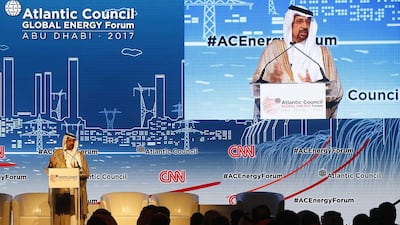Opec members could renew their six-month output cut agreement, the Saudi oil minister said yesterday, as members, including Iraq, gave assurances of supply cuts despite scepticism about compliance.
Opec agreed in November to trim output by some 1.2 million barrels per day (bpd) starting this month and some members including Saudi Arabia and Kuwait have pledged to outdo their commitments and pare some more barrels, helping prices to rally.
Non-Opec members led by Russia have also agreed to cut output by 558,000 bpd, the first such collaboration between Opec and non-Opec countries since 2001.
“The agreement we have is for six months for the specific reason that we don’t know what is going to happen by mid-year and then we will reconsider renewing it,” Khalid Al Falih, the Saudi oil minister said at the Atlantic Council Global Energy Forum in Abu Dhabi.
Currently Saudi Arabia is producing below 10 million bpd and wants to make sure members within and outside Opec comply with the cuts, he added.
“We are going the extra mile to lead our colleagues within and outside Opec to make sure the market sees that there is serious action,” Bloomberg reported Mr Al Falih as saying.
International benchmark Brent was up 1.3 per cent at US$55.84 per barrel in London afternoon trading. It is up some 11 per cent since the November 30 Opec agreement, the first such cut in eight years.
“We have been moving towards a rebalanced market for some time, a bit too slowly for my liking,” said Mr Al Falih.
“The even better news is that the pace of rebalancing will accelerate by the recent production agreements within Opec and with our partners from outside Opec.”
Maturing fields such as those in the North Sea and China will also help to rebalance the market.
“I am confident that the combination of capping production by about 25 countries and then both the demand, as well as decline in mature basins, that the market will continue to rebalance and the price will respond accordingly,” said Mr Al Falih.
The UAE Minister of Energy Suhail Al Mazrouei also expects a balancing of the market to take place, which will be aided by the maturing of fields. But he said Opec needs to monitor the recovery in shale oil production over the next six months.
“We are in the right trajectory for balancing the market and we are hopeful that the commitment that Opec and non-Opec put in place will help the market recover,” said Mr Al Mazrouei. “If shale oil rebound is huge, then it is not going to help what we are doing.”
Opec members Saudi Arabia, Kuwait, Iraq and the UAE confirmed their commitment to the Opec cuts, dispelling scepticism about compliance. Kuwait’s oil minister Issam Almarzooq said the country had cut some 133,000 bpd from its production, more than it had committed to.
Mr Almarzooq has a central role in the deal as joint chairman, with his Russian counterpart, of the monitoring committee that is charged with developing a mechanism to ensure compliance. They will decide how they will do this when they meet first on January 22 at Opec headquarters in Vienna.
Mr Almarzooq said there have been encouraging signs from some of the countries that signed up to the deal, but he said he expects to be vigilant in tracking compliance.
“Since January, we have been in contact with many countries [from which] we have seen no reaction to the cuts,” Mr Almarzooq said, adding that the committee is encouraging them to be transparent about how they will make the cuts.
Iraq also said it was complying with output cuts by paring 170,000 bpd from its exports and plans to cut further 40,000 bpd by the end of next month.
“Iraq is definitely committed [to the deal] to ensure a positive outcome even though Iraq should have been exempted form the production cuts due to the exceptional circumstances of the country,” said the country’s oil minister, Jabar Al Luaibi, referring to its battles with terrorists in the west and ongoing political divisions.
Iraq’s compliance has been one of the main question marks concerning the output cut deal. But the Opec secretary general Mohammed Barkindo dismissed those concerns.
“I have met the Iraqi minister this morning here and he has reassured me that Iraq will implement its part of the bargain and on a timely basis and I have no reason to doubt that,” said Mr Barkindo.
business@thenational.ae
* with agencies
Follow The National's Business section on Twitter

